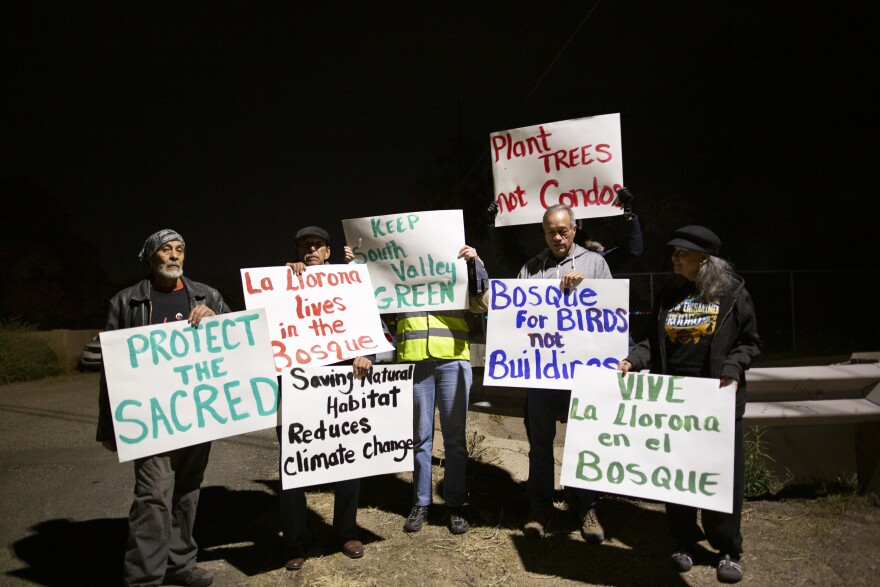On a chilly night deep in the South Valley right along the Albuquerque city limits, a group of people dressed in heavy coats gathered on a street corner. These residents of the Vecinos del Bosque neighborhood gathered to protest a new co-housing development project that would put 27 new houses between their historic neighborhood and the Rio Grande. They waved flashlights on their signs for cars passing by. One read ‘plant trees not condominiums.’
Eveline Fernandez said she wants to spread awareness about the harm the Co-Housing ABQ project can do. "“We’re here to try and save our environment," said the retired educator who has taught at many nearby schools. "The gentrification that has happened in the South Valley is just starting. This is going to ignite the ability for developers to continue to gentrify our Old Atrisco heritage, our Mijo heritage, Los Padillas heritage.”
Fernandez said she’s also concerned about property taxes going up and points to gentrification happening in Santa Fe.
Charlotte Walters, a retired librarian from the University of New Mexico, has lived here for over 25 years. She’s worried about the special permission county commissioners gave the housing project.
“It’s the foothold for developers to start putting 2 and 3 story condos along the Bosque," Walters said. "This is primo deluxe property. We believe it is doing environmental and cultural damage to our community.”
Nearby, members of the co-housing project were huddled around fires, making luminarias (or faralitos as they're known in Santa Fe.)
Marlies Metodi, a project manager for Co-housing ABQ, said they’re trying to do as little harm to the environment as possible. She plans to move into one of the houses with her family.
“What we are trying to do is make an integrative approach," she said. "We are clustering our homes together and we are making them a small footprint so that we have a lot of open space and agricultural land leftover."
Co-housing is nothing new or radical, she said. "It’s really going back to the roots of how people evolved in small tribes, living together and supporting each other. Co-housing is really about getting that village back together.”
Jim Brown and his wife bought into the project. He saids he’s always been into the idea of co-housing.
“I love community and love to be around people that think like I do and these people most certainly do," said Brown. He’s spent a lot of time talking to neighbors. “They understand that our project will make a nice buffer between their neighborhood and the Bosque. So it maybe can cut down the number of homeless people coming into the neighborhood."
This co-housing project might not cause an increase in property taxes overnight but according to local research, a condominium here and a coffee shop there could have a long-term impact.
Albert Sanchez is concerned the nature of this place his ancestors once called home will be destroyed as these new developments move in.
“My family has lived here for generations. Almost a couple of centuries," Sanchez said. This project doesn’t benefit the community with roots here, he said, it’s just another example of people moving in and not contributing. “They want to get the luxuries of living next to the Bosque but they are not going to integrate their kids in our public schools. It’ll probably be secluded and they’re not going to allow anybody to come in.”
“We still have three acres right next to it, that’s why we are in for it," said Priscilla Sias, who owned the land with her husband, Valentine Sias, before selling to the co-housing project. "We need the kids in the area. There’s no children around here that can play with my granddaughter. I mean this would be great for the community, for the schools and for everybody concerned."
Opponents of the co-housing project have filed an appeal with the county commission to undo their approval and halt the project.





